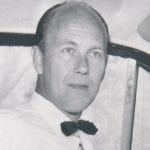 Technology
Technology  Technology
Technology  Miscellaneous
Miscellaneous 10 Incredibly Valuable Chinese Antiques Discovered by Accident
 Crime
Crime 10 Startling Cases of Jurors’ Mischief
 History
History 10 Facts about the Last Man to Be Hanged for Treason in the UK
 Movies and TV
Movies and TV 10 Actors Who Returned to Roles after a Long Absence
 Animals
Animals 10 Clever Creatures That Don’t Have a Brain
 Crime
Crime 10 Evil Pastors Who Killed Their Family
 Politics
Politics 10 Politicians Who Beat a Future President
 Sport
Sport 10 Wild Facts about the Crazy First Years of the Tour de France
 Movies and TV
Movies and TV 10 Great Songs by Fictional Musicians in Movies
 Technology
Technology Lost in Transmission: 10 Unsung Heroes of Radio Innovation
 Miscellaneous
Miscellaneous 10 Incredibly Valuable Chinese Antiques Discovered by Accident
 Crime
Crime 10 Startling Cases of Jurors’ Mischief
Who's Behind Listverse?

Jamie Frater
Head Editor
Jamie founded Listverse due to an insatiable desire to share fascinating, obscure, and bizarre facts. He has been a guest speaker on numerous national radio and television stations and is a five time published author.
More About Us History
History 10 Facts about the Last Man to Be Hanged for Treason in the UK
 Movies and TV
Movies and TV 10 Actors Who Returned to Roles after a Long Absence
 Animals
Animals 10 Clever Creatures That Don’t Have a Brain
 Crime
Crime 10 Evil Pastors Who Killed Their Family
 Politics
Politics 10 Politicians Who Beat a Future President
 Sport
Sport 10 Wild Facts about the Crazy First Years of the Tour de France
 Movies and TV
Movies and TV 10 Great Songs by Fictional Musicians in Movies
Top 10 Atheists Who Changed The World
Atheists and agnostics have been around since before there was a word thought up to describe them, and throughout history, many have been reviled and revered. Most famous atheists aren’t famous for their beliefs… or lack of belief in one thing or another; their significant accomplishments are what make them stand out in history.
See Also: 10 Common Misconceptions About Atheism
The majority of atheists who are accomplished in one way or another are remembered for how they changed the world, for better or worse. These ten examples of history’s greatest atheists and agnostics contributed something of import to society, whether for good or ill, and are listed in no particular order, as they all made incredible contributions to history.
10 Sigmund Freud
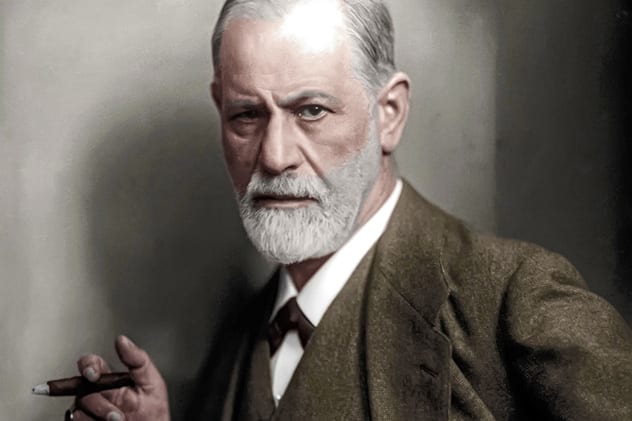
Sigmund Freud is one of the fathers of modern psychiatry, and while many of his theories have been left in the past, he was one of the most important figures in the development of the treatment of mental illness as the founder of psychoanalysis, a method used to treat psychopathology through dialogue. The work Freud did during his lifetime was certainly revolutionary, and as science has progressed into a better understanding of the chemistry of the brain, it’s unlikely we would have our modern understanding of psychiatry without his work.
When it comes to Freud’s beliefs, he was clear that he didn’t believe there was anything more than what could be observed, and this included a god, as well as an afterlife. “It would be very nice if there were a god who created the world and was a benevolent providence, and if there were a moral order in the universe and an afterlife; but it is a very striking fact that all this is exactly as we are bound to wish it to be.” Freud was more interested in the study of the nature of human beings, and while he analyzed the complexity of the human mind, he preferred to seek a rational explanation for our existence.[1]
9 Stephen Hawking
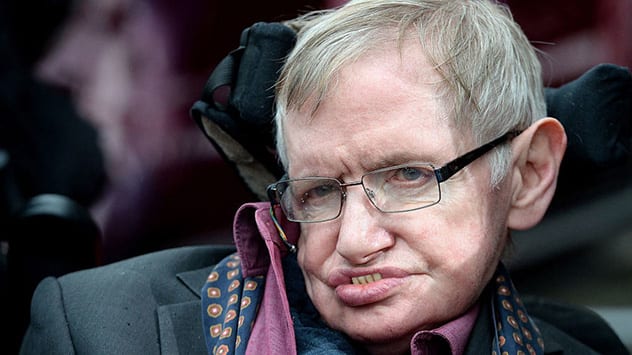 Stephen Hawking was one of the most brilliant physicists ever to live, and his work stands on par with that of Einstein, who is also on this list. Hawking wrote about his beliefs on a number of occasions, but he couldn’t have been clearer in his work, The Grand Design, in which he wrote, “Because there is a law such as gravity, the universe can and will create itself from nothing. Spontaneous creation is the reason there is something rather than nothing, why the universe exists, why we exist.” He further wrote that “science can explain the universe, and that we don’t need God to explain why there is something rather than nothing or why the laws of nature are what they are.”
Stephen Hawking was one of the most brilliant physicists ever to live, and his work stands on par with that of Einstein, who is also on this list. Hawking wrote about his beliefs on a number of occasions, but he couldn’t have been clearer in his work, The Grand Design, in which he wrote, “Because there is a law such as gravity, the universe can and will create itself from nothing. Spontaneous creation is the reason there is something rather than nothing, why the universe exists, why we exist.” He further wrote that “science can explain the universe, and that we don’t need God to explain why there is something rather than nothing or why the laws of nature are what they are.”
In terms of his contributions to the world of science, he was the first to set out a possible theory to create a union of the General Theory of Relativity and Quantum Mechanics. He spent his life working to find the Grand Unified Theory, though it remained unproven during his lifetime. He became a commercial success with his book A Brief History of Time, which helped explain the complex nature of the universe to a wider audience. He made it possible for less-learned people to understand otherwise complicated mathematics and scientific theories related to physics and quantum mechanics, bringing science to the masses.[2]
8 Hypatia

Though she may not be a household name, Hypatia of Alexandria was an early developer of philosophy, astronomy, and mathematics, who lived in Alexandria, Egypt, between 350-370 and 415 A.D. She was a teacher of astronomy and philosophy, and she holds the distinction of being the first female mathematician whose life was recorded in any significant way. She was highly respected throughout much of her lifetime, and while she wasn’t herself a Christian, she taught several Christian students and went on to advise Orestes, the Roman prefect of her city.
Eventually, she was caught up in a series of rumors, which accused her of preventing the prefect from reconciling with the Bishop of Alexandria. This led Peter the Lector to gather a mob of Christians who murdered her in 415 A.D., and that killing shocked the empire. She was instantly transformed into a martyr for philosophy and has stood as such since her death, more than 1,600 years ago. Hypatia has become a symbol of women’s rights, and her work helped establish the feminist movement of the late 20th-century.[3]
7 Andrei Sakharov
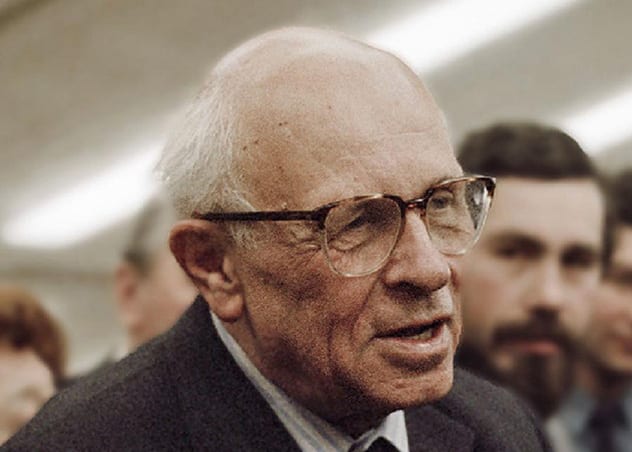
Andrei Sakharov was a nuclear scientist in the Soviet Union, who was one of the men chiefly responsible for the development of the Hydrogen Bomb in his country. While that may not seem like a thing to celebrate, the latter half of the 20th-century was directly influenced by the establishment of a nuclear-armed USSR, and there’s no denying the influence the weapon had on the world. Still, Sakharov could be remembered for his work in nuclear weapons technology, but he’s better recognized as a recipient of the Nobel Peace Prize, and for his work on human rights.
Sakharov received the award in 1975 for his work advocating civil liberties and reforms in the Soviet Union, which garnered a great deal of state persecution. He was an outspoken critic of the USSR, and one of the nation’s most courageous critics. He spent the better part of his life working for a global denuclearization and to further human rights and freedoms, which was recognized by the creation of the Sakharov Prize, an award given out annually by the European Parliament for people and organizations dedicated to the principles Sakharov worked to achieve.[4]
6 Ayn Rand
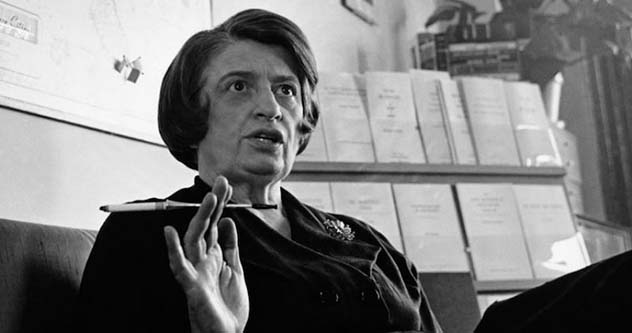 Ayn Rand was a rationalist whose understanding of society in regards to religion could best be described as antagonistic. Rand opposed both the idea of communism, which is typically atheistic in implementation, as well as the idea of religion. She wasn’t unclear on the subject either, having said the following in regards to her thoughts on God. “Actually, if I can sum up my attitude on the question of God, it’s this: from all I can gather, the definition of God is ‘That which the human mind cannot grasp.’ Being a rationalist, literal-minded, and believing that it is a moral obligation to mean what you say, I take the persons who made the above definition at their word, I agree and obey them: I don’t grasp it.”
Ayn Rand was a rationalist whose understanding of society in regards to religion could best be described as antagonistic. Rand opposed both the idea of communism, which is typically atheistic in implementation, as well as the idea of religion. She wasn’t unclear on the subject either, having said the following in regards to her thoughts on God. “Actually, if I can sum up my attitude on the question of God, it’s this: from all I can gather, the definition of God is ‘That which the human mind cannot grasp.’ Being a rationalist, literal-minded, and believing that it is a moral obligation to mean what you say, I take the persons who made the above definition at their word, I agree and obey them: I don’t grasp it.”
Rand’s work, specifically her novels Atlas Shrugged and The Fountainhead, have helped preserve her ideologies and the Objectivist movement, which continues to this day. She was a strong advocate for reason, which she considered to be the only means of acquiring knowledge. Her work has been embraced across multiple political ideologies, including libertarians and American conservatives, who have established themselves well into the United States government, where they promote her ideas on Capitalism and individual rights.[5]
5 Thomas Edison
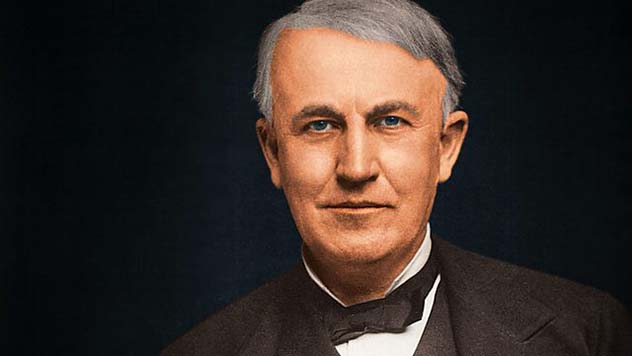 Thomas Edison was one of the most prolific inventors of his time, and he’s well known for being the father of the modern incandescent bulb, the phonograph, motion picture camera, and many more incredible inventions that are still in use. Throughout his life, he acquired 1,093 patents, and he became a wealthy and powerful businessman in New Jersey, where he was known as the Wizard of Menlo Park. Edison was a rationalist, and he was antagonistic towards religion.
Thomas Edison was one of the most prolific inventors of his time, and he’s well known for being the father of the modern incandescent bulb, the phonograph, motion picture camera, and many more incredible inventions that are still in use. Throughout his life, he acquired 1,093 patents, and he became a wealthy and powerful businessman in New Jersey, where he was known as the Wizard of Menlo Park. Edison was a rationalist, and he was antagonistic towards religion.
Edison once said, “So far as religion is concerned, it’s a damned fake. Religion is all bunk.” He also suggested that all religions were created by men, and that “All Bibles are man-made.” These were not the words of a man struggling to identify his faith; he was certainly not a traditional believer, at least where any established religion was concerned. That being said, he could have had a personal belief in some form of supernatural deity or another, but he clearly had no time for others’ beliefs in a personal god or afterlife. If he were to be labeled as anything, he might be better described as a pantheist, which is a belief that equates all of reality with divinity.[6]
4 Albert Einstein

Albert Einstein’s beliefs have been the subject of debate for decades, which leaves many to refer to his own words on the subject, of which there are few. Einstein declared himself an agnostic, and specifically said in an interview in 1929, “I am not an atheist.” He also said he didn’t believe in life after death, once claiming that “one life is enough for me.” In terms of how Albert Einstein changed the world, there’s plenty to discuss. Einstein is most famous for his work on the Theory of Relativity, as well as his explanation of mass-energy equivalence in what is likely the most famous equation in the world, E=mc2.
His theories on Relativity have been tested and proven time and time again, and they make it possible to predict gravitational interactions. If that seems like it’s above your pay grade, it may be, as it’s especially useful in determining how to navigate in spaceflight, learning how stars and planets form, and pretty much anything to do with space, time, or gravity. His work in physics was paramount in accelerating technological developments throughout the 20th-century, and he even postulated the possibility of creating an atomic bomb, which was described in a letter 8to then-President Franklin D. Roosevelt. Einstein and Leó Szilárd, a German-American physicist, warned the President that Germany could be developing the bomb in 1939, and suggested the U.S. beat them to it, which they ultimately did.[7]
3 Rosalind Franklin
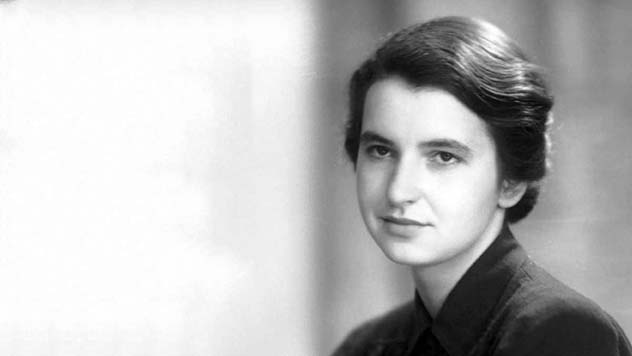
Rosalind Franklin was an English chemist whose work in understanding the molecular structures of DNA, RNA, coal, graphite, and viruses helped change the world of medicine and the biological sciences. Franklin was one of the key figures responsible for understanding the nature of DNA. She passed away in 1958, with no recognition on that subject, which was instrumental in James Watson and Francis Crick’s discovery of the DNA double helix. That discovery earned them a Nobel Prize in Physiology or Medicine in 1962. Though she had already passed, Watson suggested at the time that Franklin should have likewise been recognized by the Nobel Committee for her work in chemistry.
Crick also recognized Franklin’s work, as it comprised the data he and Watson used to discover the structure of DNA, though it was taken and used without her knowledge. While she wasn’t recognized for her contribution while she was alive, she has received widespread posthumous recognition by the scientific community. In terms of her beliefs, she once wrote, “I do not accept your definition of faith, i.e., belief in life after death. In my view, all that is necessary for faith is the belief that by doing our best we shall come nearer to success and that success in our aims (the improvement of the lot of mankind, present, and future) is worth attaining.”[8]
2 Karl Marx
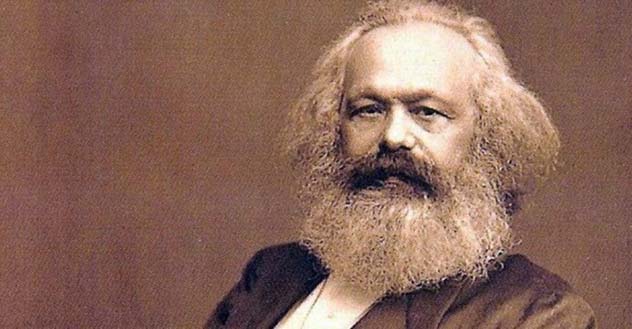
Karl Marx is widely revered in many parts of the world due to his writings, which established the modern concepts of Communism, Socialism, Historical Materialism, and Marxism. Marx was a philosopher whose work on societal structures opposed the ideas of religion and the existence of social classes. He argued that a society without social classes would enable all men to be free, working together to achieve for the common good of humanity. Unfortunately, his writing has never been tested in the manner he theorized, as modern undertakings of Socialism and Communism perverted his desire for a classless society.
Marx was an avowed atheist, and he didn’t just disbelieve in gods, he opposed the worship of them. He once wrote that man “is dominated by the product of his own head as he is dominated in capitalistic production by the product of his own hand.” To Marx, religion was as dangerous to society as Capitalism, preferring to abandon materialism and superstition for a more tangible human experience. His work influenced that of Lenin, Stalin, Mao, and many others who became dictators of their nations. While that’s not necessarily a good thing, he had a longlasting impact on the human condition and is one of the most influential socialist thinkers of the 19th-century.[9]
1 Alan Turing
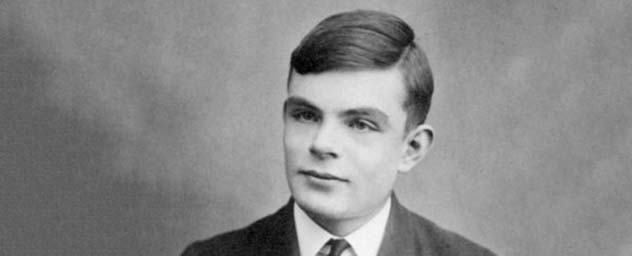 Alan Turing is known today as both the father of computer science and the founder of artificial intelligence. If you’re reading this on a computer, phone, or any other electronic device, you can thank Turing for his work. He was instrumental in constructing a logic device capable of breaking the Enigma Machines used by Germany during the Second World War, and that breakthrough established a pathway that led to the development of the first true computer. Turing’s contributions cannot be overstated, as he was one of the most significant contributors to the Allied war victory as well as computer science.
Alan Turing is known today as both the father of computer science and the founder of artificial intelligence. If you’re reading this on a computer, phone, or any other electronic device, you can thank Turing for his work. He was instrumental in constructing a logic device capable of breaking the Enigma Machines used by Germany during the Second World War, and that breakthrough established a pathway that led to the development of the first true computer. Turing’s contributions cannot be overstated, as he was one of the most significant contributors to the Allied war victory as well as computer science.
When the war ended, he continued his work but was eventually exposed as being homosexual, which was a crime in England at the time. He chose to be chemically castrated to avoid jail time, but this ultimately led to depression and his suicide. Since his death, he has been widely recognized for his efforts, which helped create the concept of computer science, and the modern world in which we live in today. In terms of his beliefs, Turing renounced his faith in 1930 after his friend, Christopher Morcom died suddenly from bovine tuberculosis.[10]
For more lists like this, check out Top 10 Christian Holidays Even Atheists Celebrate, and 10 People Who Give Atheism a Bad Name


